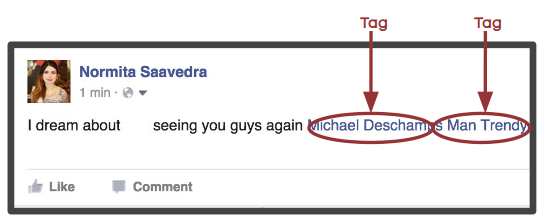[Caption: Example of Facebook Post with People tagged.]
With the “@” sign, we are now able to include others in our lives more easily. Tagging or mentioning people in content lets you share the story with someone in front of everyone, demonstrating publicly both your friendship and the shared interests that created it. We did interviews with 120 participants to uncover perceptions on tagging people.
Tagging To Build Stronger Relationships.
Most (79%) saw tagging as a way to build strong relationships, citing: “it made people feel special to have someone making time for them to tag them.” Tagged posts generated automatically by companies were not perceived as positively, because people did not connect them with genuine human connections. As designers we need to help companies better engage with their online clients, one option being encouraging more humanized interactions. The discussion matters given the recent lawsuit over people’s names appearing in tagged ads.
Tagging to influence Facebook’s algorithms, and distribute more surprising content.
Our interviewees (61%) saw tagging as a way to expose audiences to information outside of what they saw on Facebook. There was a notion that Facebook showed to friends a same type of content. Tagging broke this by letting people reach new social graphs at once (e.g., the friends of the taggees), and share with them information outside their norm. One woman, said, “I like to tag people that I know are interested in something and whose audience will also care. But my interest is in creating a crossover. So I involve audiences that follow people in dance, but I share with them something totally different, such as poetry.”
Another, told a folk story of how tags influenced Facebook’s algorithms and helped give her content more viewers, “If I tag someone and then he comments, the post becomes ‘active’ and it’ll appear at the top of the News Feed. So I’ll sometimes tag someone directly in the post or in the comments. In either case, if it makes him comment, the post will be pushed to the top.”
Recommendation algorithms have tried to filter opinions, people and items that are different to us, limiting the diffusion of information. Our study highlights how people appear to value “things outside the norm”. Our interviewees had a need to distribute fresh information that could free audiences from algorithmic biases. Our research on tagging thus raises the question — would social media benefit from more official digital structures tailored for targeting new audiences and sharing with them strange information? Audiences could be bombarded with more unwanted content, but it could also facilitate “serendipitous” discoveries.
To read more, checkout our Hyptertext 2015 research paper:
Tag me Maybe: Perceptions of Public Targeted Sharing on Facebook,
with Saiph Savage, Andres Monroy-Hernandez, Kasturi Bhattacharjee, Tobias Hollerer.
Tag me Maybe: Perceptions of Public Targeted Sharing on Facebook,
with Saiph Savage, Andres Monroy-Hernandez, Kasturi Bhattacharjee, Tobias Hollerer.
